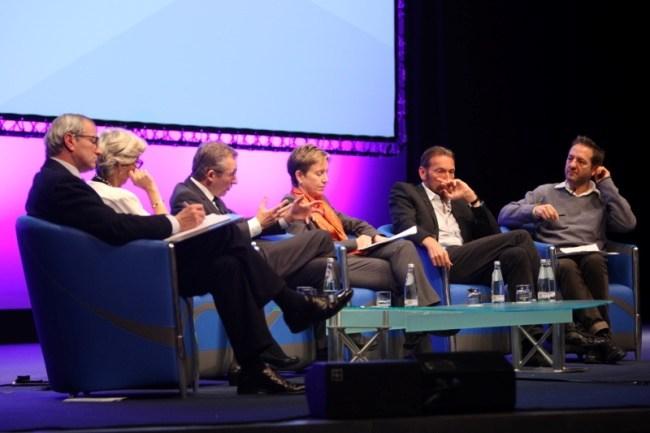Caesars Supports Marriage Equality with a Wedding Giveaway


New Jersey became the fourteenth state to legalize gay marriage last October, and now Caesars Entertainment is joining in the festivities, offering one lucky couple an extravagant $50,000 wedding package at one of the company’s Caesars, Harrah’s, Bally’s and Showboat resorts and casinos in Atlantic City.
Dubbed the “Love Is Love” giveaway, the prize features a wedding ceremony and reception for 100 guests, a cocktail hour, dinner, custom cake designed by celebrity chef Deb Pellegrino, two-hour open bar, photographers, flowers and entertainment. The winning couple will also receive bachelor or bachelorette parties, a day-after brunch for up to 50 guests and luxury accommodations for their guests and themselves.
To enter the contest, couples have until March 14 to make a video explaining why they’re the best duo to win the prize, and post it to Instagram tagging @Total_AC and using the hashtag #LoveIsLoveInAC. All Instagram users are invited to vote in the contest, searching the #LoveIsLoveInAC hashtag and “liking” their favorite video. A panel of judges will select the winning couple from the five most “liked” videos.
While naysayers may be quick to criticize Caesars Entertainment’s “Love Is Love” contest as a publicity stunt rather than a political statement advocating marriage equality, the company touts its long record supporting the LGBT community: Caesars scored 100 percent on the Human Rights Campaign’s Corporate Equality Index for six consecutive years and partners with the Gay and Lesbian Alliance Against Defamation, International Gay and Lesbian Travel Association, National Lesbian and Gay Journalists Association and Human Rights Campaign.
Whether you think Caesars cares about equal rights for the LGBT community or is simply looking for good PR, it is becoming increasingly clear that LGBT discrimination is bad for business.
Last week, Arizona Gov. Jan Brewer vetoed a bill that would have given the state’s business owners the right to refuse service to gay and lesbian customers because of their religious beliefs. But before Brewer could strike down the controversial legislation, the Hispanic National Bar Association said it cancelled plans to hold its annual convention in Arizona next year, and the National Football League, set to host the 2015 Super Bowl at the University of Phoenix’s stadium, started looking for alternative venues in case the bill was signed into law. JPMorgan Chase, one of Arizona’s largest employers, also took a stand against the bill, and tech companies like Apple and AT&T urged the governor to veto it, saying the law was discriminatory and would damage the state’s business climate.
While it’s challenging to call a company that encourages the unhealthy behavior of gambling, smoking and drinking socially responsible, it is refreshing to see a corporation make such bold statements in support of marriage equality in a campaign, rather than simply quietly acknowledging the importance of acceptance and nondiscrimination in its corporate policy.
Also last week, Caesars received a climate leadership award from the Environmental Protection Agency for achieving its goals to reduce greenhouse gas emissions. This accomplishment, along with Caesars’ pro-marriage equality giveaway contest, demonstrates that casino companies can strive for good corporate citizenship–just in their own way.
Image credit: Flickr/Elvert Barnes
Passionate about both writing and sustainability, Alexis Petru is freelance journalist based in the San Francisco Bay Area whose work has appeared on Earth911, Huffington Post and Patch.com. Prior to working as a writer, she coordinated environmental programs for Bay Area cities and counties. Connect with Alexis on Twitter at @alexispetru
Copper, Salmon and Healthy Waters: EPA Puts a Halt to Pebble Mine Project


Any form of economic decision-making–whether to invest in a coal mine or solar power project, to buy this brand of good or product or that–comes replete with trade-offs, particularly when it comes natural resource development. We rely on markets and private sector businesses and investors, working within the context of public sector governance, to guide and approve, or disapprove, of those decisions.
Such trade-offs are clearly in evidence in Alaska's Bristol Bay watershed, one of the world's richest, most productive and few remaining wild salmon fisheries. Bristol Bay is also the site of the proposed Pebble Mine, envisioned by project developers as one of the world's largest open-pit copper mines.
Concerned about Pebble Mine's impact on the Bristol Bay fishery and watershed–which provides basic ecosystem services, such as water, food and shelter, and sustainable livelihoods for communities throughout the area, the Environmental Protection Agency (EPA) this past week invoked Section 404(c) of the Clean Water Act in initiating a process “to identify appropriate options to protect the world's largest sockeye salmon fishery in Bristol Bay, Alaska from the potentially destructive impacts of the proposed Pebble Mine.”
The Pebble Mine: A huge copper resource
The EPA's action temporarily puts a halt to the U.S. Army Corps of Engineers approving a permit that would allow the Pebble Limited Partnership (LP) to move forward with its plans to develop the Pebble Mine. Those plans envisage a five-year construction phase followed by an initial 25 years of production. Three subsequent development phases of 20 years each are also held out as a possibility.
Located in southwestern Alaska on national public land some 230 miles southwest of Anchorage as the crow flies, the Pebble Mine site is remote. Developing a mine there would require building extensive infrastructure--roads, power, water, even a deep-water port. What lies beneath the surface is said to be one of the world's largest copper porphyry deposits, one that also holds substantial amounts of molybdenum and gold.
The scope and scale of the deposit is humongous, as would be its effect on ecosystems across the area and far beyond. As is typical of such deposits, the actual copper, gold and molybdenum-bearing minerals are disseminated thinly throughout the vast area of bedrock.
As the Pebble Partnership notes on its website, "Ore from this type of deposit typically contains less than 1 percent copper by volume, sprinkled throughout the rock like fine grains of sand. That means miners will dig a very wide, very deep hole--projected to be two miles wide and several thousand feet deep--to extract and then process millions of tons of rock. All the excess rock--estimated at some 10 billion tons--along with allowed discharge chemicals would be stored indefinitely in two artificial lakes behind massive earthen dams. The largest of these dams would be 740 feet (230 m) tall and 4.3 miles (6.9 km) long.
Copper, jobs and state revenues
Imports meet 35 to 40 percent of U.S. copper demand at present. Developing the Pebble Mine would boost U.S. copper production by 20 percent, according to an economic study of the project commissioned by the Pebble Partnership and conducted by IHS Global Insight. Moreover, the Pebble Partnership highlights, exploiting the Pebble copper deposit could boost Alaska state government revenues an estimated $136 billion to $180 billion a year in taxes and royalties, making the Pebble Mine one of the top five contributors to the state treasury. Tax revenue for the local Lake and Peninsula area would increase by an estimated 600 percent.
IHS Insight researchers also project that the copper, gold and molybdenum mine could support more than 16,000 jobs nationwide during construction, including nearly 5,000 jobs in Alaska alone during the construction phase with an average annual wage of $63,500 per year. "Pebble operations could support nearly 15,000 jobs in Alaska and the Lower 48; and potential subsequent development phases could support more than 16,000 jobs nationwide," according to the report.
As Pebble LP CEO John Shively stated:
“Pebble is a substantial multi-billion dollar state asset as shown by this report, which provides great insight regarding the long-term positive economic impacts the project could have for the region, state and the Lower 48. For perspective, the report indicates Pebble development alone would pay more in annual taxes to the state than the entire fishing industry combined. This clearly shows Pebble development could be an important economic driver for Alaska’s future.”
Copper vs. local communities, fisheries, and a watershed
So, as Shively points out, a pound of copper is worth a lot more than a pound of fish, even wild salmon. But does Pebble LP's studies and analysis tell the whole story? The EPA, as well as other opponents of the project, believe it doesn't, not by a long shot.
Explaining the EPA's decision to invoke Section 404(c) and put a temporary halt to mine development, Administrator Gina McCarthy stated,
“Extensive scientific study has given us ample reason to believe that the Pebble Mine would likely have significant and irreversible negative impacts on the Bristol Bay watershed and its abundant salmon fisheries.“It’s why EPA is taking this step forward in our effort to ensure protection for the world’s most productive salmon fishery from the risks it faces from what could be one of the largest open pit mines on earth. This process is not something the Agency does very often, but Bristol Bay is an extraordinary and unique resource.”
Regional Administrator for EPA Region 10 Dennis McLerran notified the U.S. Army Corps of Engineers, the Alaska state government and the Pebble Partnership that it has initiated action under Section 404(c) of the Clean Water Act.
McLerran not only highlighted the economic value of Bristol Bay's sockeye salmon fishery, but the deep, lasting social and ecological value of the Bristol Bay watershed to communities throughout the area.
“Bristol Bay is an extraordinary natural resource, home to some of the most abundant salmon producing rivers in the world. The area provides millions of dollars in jobs and food resources for Alaska Native Villages and commercial fishermen.
He also highlighted the threats and losses–economic, social and ecological–that would result if the Pebble Mine were to be developed as proposed.
“The science EPA reviewed paints a clear picture: Large-scale copper mining of the Pebble deposit would likely result in significant and irreversible harm to the salmon and the people and industries that rely on them.”
The EPA's decision is based on data gathered as part of its Bristol Bay ecological risk assessment and mine plans Pebble LP submitted to the Securities and Exchange Commission (SEC).
Documenting the findings of scientific investigators, the EPA in January released its “Assessment of Potential Mining Impacts on Salmon Ecosystems of Bristol Bay, Alaska.” According to the EPA:
“The assessment indicates that the proposed Pebble Mine would likely cause irreversible destruction of streams that support salmon and other important fish species, as well as extensive areas of wetlands, ponds and lakes.”
A natural capital approach to resource extraction
What's more valuable, and to whom, and what are the overall social and ecological, as well as economic, impacts of such economic development projects? Given the profound, long-lasting impacts of any such project on the ecosystems that underlie the fundamental health and well-being of communities and society, these are questions that need to be comprehensively and thoroughly assessed in an open, inclusive and transparent process.
In a bygone era, any disputes over developing a gigantic mine probably would have been settled directly between locals and mine developers. They would likely have involved much money changing hands to influence opinions, as well as a good degree of intimidation, if not outright armed conflict between opposing camps. Ecological considerations, aside from the direct impact on the fishery and possible effects of water toxicity many years in the future, would probably have received little if any consideration.
Times have changed, and technology and society along with them. So even has economic thinking. Today, proponents of natural capital envision a system of economic decision making that entails evaluating the social and ecological costs and benefits to natural resource use and development.
Critically, from a broader societal perspective, the issue of how various costs and benefits would be distributed locally and more broadly across to local communities and fundamental ecosystems and services, as well as business management and investors is a core aspect of the Natural Capital framework. It's an approach the EPA appears to be taking in its decision to put a halt to the permitting process, and one that needs to be undertaken in any mineral, energy or other natural resource extraction project.
Image of fisherman on Bristol Bay courtesy of Alaska Conservation Foundation
Image of Bristol Bay: Flickr/KatmaiNPS
I love Bristol Bay poster courtesy of Trout Unlimited
A Reply to the IOC’s Response on Human Rights in Sochi


On Feb. 10, as the 2014 Winter Olympics were about to kick off in Sochi, Russia, I wrote a post arguing that the International Olympic Committee (IOC) may have acted contrary to the U.N. Guiding Principles on Business and Human Rights (UNGPs), flowing from the IOC’s decision to allow Russia to host the 2014 Winter Games. That post was linked to by the Business & Human Rights Resource Center, which went on to request comment from the IOC. To my surprise, the IOC actually responded. Given that the IOC found the time to respond to me, I thought it only proper to return the favor.
The IOC’s response can be broken down into two basic arguments:
-
First, the UNGPs do not apply to the IOC because the IOC is not your run-of-the-mill corporation; and
-
Second, even if the UNGPs do apply, and to the extent that Russia engaged in human rights violations in preparation for the games (as others have documented and I summarized), the IOC complied with the UNGPs by addressing those violations.
The IOC is different
The IOC isn’t commercial. The IOC’s first argument appears to be that the UNGPs do not apply to the IOC because the IOC is unlike a “commercial company.” To illustrate, the IOC points out that its product is “a set of values symbolized by the Olympic rings,” rather than “a laptop or a smartphone.” Fine. But even if we agree that the IOC deals in “values” rather than, say, entertainment (and I’m not sure we should agree), I don't see how that is relevant.
Whether a business enterprise is obligated to comply with international human rights law does not turn on how similar that enterprise’s product is to a consumer electronic good. The UNGPs apply whether an organization sells petroleum, produce, prescription medication or anything else, and to imply that it is only the Apples of the world that are obligated to follow the UNGPs is to miss the point entirely. To accept the IOC’s argument would be akin to allowing Nestle to defend itself against allegations of human rights abuse in its supply chain because Nestle sells a “taste experience” rather than chocolate bars. The IOC had a duty to ensure that its business partners--in this case, the Russian government and the Russian government’s contractors--did not engage in human rights violations, and the way the IOC decides to define its product has no impact on that duty.
The IOC does a lot of good. The IOC also relies heavily on the fact that “the games are designed to bring lasting benefits to the host city and nation.” I do not doubt that--in fact, I experienced those benefits first hand when riding the Athens subway after the 2004 Summer Games (it beat your typical NYC commute, that's for sure). Yet, again, I question the relevance. Many major multinationals engage in extensive philanthropy; others have robust corporate social responsibility (CSR) programs. These are important facts that should be encouraged, and the IOC should likewise be applauded for its community revitalization efforts. However, those ancillary benefits have absolutely no bearing on the IOC’s or any other entity's obligations under the UNGPs.
The IOC didn’t “transact” with Russia. The IOC also states, almost off-hand, that its “engagement with a host nation is not a transactional relationship.” The relationship may or may not be explicitly transactional, but it is surely contractual and there are resultant obligations imposed upon both parties--implicitly or otherwise--once the IOC decides to award a particular games to a particular country. Whether Russia and the IOC literally exchanged payment for services is beside the point.
The IOC did what it could
The foregoing arguments notwithstanding, the IOC ultimately concedes that it “has a responsibility to defend human rights in games-related cases.” Its defense is twofold: that it sought certain “assurances” from Russia; and that it eventually intervened in the games-related cases I cited.
As the IOC acknowledges, it had a duty to take remedial action with respect to games-related human rights abuses (as it promised to do in 2011). That it did make efforts to intervene and remediate in certain instances is significant and commendable. Yet, as Human Rights Watch noted, “[w]hile the IOC’s late action is important, more workers would have benefited if it had acted sooner.” I am in no position to add anything to what HRW has already said on this point.
The more troubling point is the IOC's implication that seeking assurances from Russia somehow satisfied the IOC's human rights obligations. First, nothing about the Putin regime would suggest that a human rights commitment from the Russian government should be trusted or taken seriously. I am sure the IOC realizes that, which is perhaps why it attempts to hide behind the claims that the IOC is “not equipped to conduct its own investigation into allegations of human right abuses,” and that it is “first and foremost a sport organization,” which “must rely on information provided by NGOs and by government authorities in the host nation.”
I believe the IOC when it says that it takes its “obligation to defend human rights in games-related cases quite seriously and will continue to meet that obligation to the best of our ability.” Yet, it is disingenuous for the IOC to imply that it was powerless to discern the potential for serious human rights abuses in connection with a Sochi Winter Games, absent some indication of that risk from a third party. All of which, by the way, is moot, in light of the fact that, “[s]tarting in 2008, Human Rights Watch has regularly raised concerns with the IOC about abuses linked to the Russian government’s preparations to host the 2014 Winter Olympics in Sochi.”
In any case, the IOC was on notice, implicitly or explicitly, of the potential for games-related human rights abuses in connection with a Sochi Olympics, just as it was in Beijing.
Image credit: Flickr/{ QUEEN YUNA }
Los Angeles Shuts the Door on Fracking's 'Red Queen'


Last week, Los Angeles joined the growing list of cities and towns banning, at least temporarily, gas and oil fracking within their borders. The main concerns are over public health and water resource preservation, but economic impacts and property values also come into play. The news comes on the heels of yet another article in the mainstream press that paints a picture of the fracking industry as a swelling bubble that will make a loud and messy noise when it pops.
Part of the reason why the fracking industry is so bloated right now is something that our friends over at Fuel Fix have dubbed the "Red Queen" effect, after the fictional Lewis Carroll character, so let's take a look at the Los Angeles decision in that context.
The "Red Queen" effect
Fracking is short for hydrofracturing, a formerly unusual but now routine way to shake gas and oil deposits loose from shale formations by pumping a chemical brine underground.
The "Red Queen" effect refers to the relatively short lifespan of fracking wells, which tend to reach peak production earlier than conventional wells. The industry is forced to drill thousands of new wells annually to compensate for the dropoff (Fuel Fix estimates about 6,000), and that's not even accounting for new production incentives that could arise if the Obama administration approves more export licenses.
The result of all this activity is more pressure on the industry to seek new drilling sites or re-explore disused sites, including those in heavily populated urban areas.
The Los Angeles fracking moratorium
That brings us straight to Los Angeles. As reported last Friday by Al Jazeera America, the Los Angeles City Council voted to establish a moratorium on fracking as well as other "well stimulation" activity within Los Angeles County.
The next step will be to have the city's legal team craft an ordinance and set a date for the moratorium to go into effect.
The pressure is on to act quickly because, while LA might not appear to be a hotbed of drilling activity, there are in fact a number of active drilling sites within the city, and it is dotted with thousands of inactive sites that could be reactivated.
According to the Al Jazeera report, local activists have already taken note of fracking activity within Los Angeles, as well as an oil well treatment involving acid injection.
Hopping on the fracking ban bandwagon
If and when the Los Angeles moratorium goes into effect, it will be the largest city in the U.S. to take that action.
Meanwhile, in the East Coast, the Delaware Watershed organization Keep Tap Water Safe has been keeping a running tab on activity on local fracking bans, as well as moratoriums and organized movements to ban fracking.
As of last month, the group's list included the City of Dallas in Texas, Hawaii Island in Hawaii, New Mexico County in New Mexico, and scores of local governments in New York State.
Significant movement is also afoot in Pennsylvania. Late last year, the Pennsylvania Supreme Court affirmed a lower court decision striking down a new statewide zoning plan that would have prevented local governments from restricting fracking within their borders.
The fracking bubble swells...
Mainstream media has been warning about the fracking bubble for at least two years. In May 2012 we took note of the financial travails of the major fracking industry player Chesapeake Energy Corp. as reported by the New York Times, Reuters, and National Public Radio.
Last year Rolling Stone and The Wall Street Journal also chimed in on Chesapeake, as the focus of persistent weaknesses in the natural gas industry.
Also last August, Bloomberg added to the pile with an in-depth article on the negative impact of fracking operations on local property values. That includes properties that host fracking operations as well as their neighbors.
The latter point was underscored with darkly hilarious irony just last week, when it was revealed that ExxonMobil chairman and CEO Rex Tillerson--ExxonMobil is among the largest players in the fracking industry, if not the largest--sued to stop construction on a fracking-related water tower adjacent to his property. Part of the concern was truck traffic related to water transportation for fracking operations, in addition to the unsightliness of the 160-foot tower itself.
Just last week, Bloomberg chipped in again a real bombshell report on the rising cost of oil fracking wells, reiterating the point that fracking wells peak more quickly than their conventional counterparts, leading to pressure on the industry to drill thousands of new wells every year.
Image (cropped): by theilr
Walmart's Concept Hybrid Truck Would Make a More Efficient Fleet


While the fuel economy of cars has increased dramatically over the last few decades, the fuel economy of semis has merely inched its way up. Two interesting developments may improve things for these gas-guzzling vehicles that get between 4 and 8 miles per gallon. President Barack Obama recently announced greater EPA standards for the fuel efficiency of heavy-duty trucks, and Walmart unveiled its futuristic next-generation concept truck.
The cab of the Walmart Advanced Vehicle Experience (WAVE) concept truck looks reminiscent of a bullet train, with a sleek, aerodynamic appearance that blends into the trailer. It features a microturbine hybrid power train with an electric motor and a battery. Because the front end is so tapered, the driver sits in the middle and the entry door slides open. The innovative trailer is made of 53-foot-long sheets of carbon fiber and is the first trailer to be made out of this strong and lightweight material.
The WAVE truck was created in partnership with Peterbilt Motors Co., Great Dane Trailer and Capstone Turbine Corp. It is part of Walmart's fleet efficiency program for its 7,000 trucks, with a goal to double fleet efficiency by 2015, compared to its 2005 baseline.
It is testing the Walmart Supercube, trucks that haul 30 percent more goods in the same footprint. In addition, Walmart is testing alternative vehicle fuels, including natural gas and synthetic fuel from animal fat, grease and vegetable oil. According to its 2013 sustainability report, Walmart has already boosted efficiency by 80 percent by purchasing more fuel-efficient trucks and by finding ways to deliver more goods while driving fewer miles. This resulted in savings of nearly $130 million and nearly 103,000 metric tons of CO2 emissions.
Walmart has harvested the low-hanging fruit of fleet efficiency, and the goal is pushing the company to utilize partnerships with truck and component manufacturers to create prototype tractors, including hybrid assist, full-propulsion hybrid and wheel-end hybrid assist. Ambitious sustainability goals are designed to push companies beyond their comfort zones, to encourage innovation, even if the fruits won't be reaped in the short-term. The carbon fiber trailer in the WAVE concept truck is a great example, trimming 2 tons from the vehicle.
Carbon fiber consists of extremely thin fibers that are twisted together and coated with resin or plastic. This creates a composite material that is much lighter than steel, but has similar strength. Compared to aluminum, carbon fiber is lighter, has similar corrosion-resistant properties and yet is more durable. Carbon fiber is used in spacecraft, satellites, and some race cars and can withstand high stress. Amory Lovins has been urging the auto industry to utilize carbon fiber materials for years, touting its ability to reduce fuel consumption due to its light weight, while boosting safety. What's not to love about carbon fiber?
The auto industry has been slow to utilize this material due to its cost. Some of the strategies for lowering its cost include identifying lower cost raw materials, advancing technology to convert raw materials into carbon fiber, and testing low-cost carbon fiber design and capabilities. The Corporate Average Fuel Economy (CAFE) standards for the auto industry will help motivate faster adoption of this material, which has been starting in the luxury car market. Ramping up production and use of this material will lead to falling prices and greater use.
With just a video announcement of the WAVE concept truck, next steps are unknown. In the meantime, we'll be dazzled by the brief images of this sleek truck.
http://www.youtube.com/watch?v=iTTgxqZqTaA
Image credit: Youtube
Sarah Lozanova is a regular contributor to environmental and energy publications and websites, including Mother Earth Living, Green Building & Design, Triple Pundit, Urban Farm, and Solar Today. Her experience includes work with small-scale solar energy installations and utility-scale wind farms. She earned an MBA in sustainable management from the Presidio Graduate School and she resides in Belfast Cohousing & Ecovillage in Midcoast Maine with her husband and two children.
Bing to Put Brazil's Favelas on the Map


How can you provide social services or start a new business when your city doesn't even show up on a map? That's the reality for millions of Brazilians living in favelas, or shantytowns, in Rio de Janeiro: Less than 1 percent of these densely populated urban areas have been mapped, according to Microsoft search engine Bing.
But the Google competitor hopes it can put Rio's favelas on the map, embarking on a long-term project to bring its computational power and mapping infrastructure to the city set to host this year's World Cup and the 2016 Olympics. Bing announced its new initiative during February's Global Innovation Summit in San Jose, Calif.
Is seeing their homes on a Bing map really a top priority of favela residents, or are they more concerned with meeting their daily needs and obtaining access to electricity and clean water?
This was a question posed by a reporter during an interview with Bing's Senior Director Stefan Weitz on Bloomberg Television's Bloomberg West, and reflects the developed world's naiveté regarding the real needs and concerns of developing countries and how technologically advanced these nations actually are.
Calling favelas shantytowns or slums is a misnomer, Weitz said. While favelas previously earned a reputation as dangerous, impoverished communities, recent government programs have reduced crime and increased services in the areas.
Eighty percent of those who live in these favelas in Rio, for example, are middle class, Weitz said. These are actually places that have 1 percent GDP in Brazil and have a tremendous penetration of mobile devices today.
In fact, Weitz said, 90 percent of favela residents under 30 have Internet access on their mobile devices; access to computers and the Internet is not an issue. In many cases, many favelas residents will not have electricity in their homes, but will have a cell phone.
How exactly will Bing's mapping efforts empower favela residents? Once Bing develops the mapping infrastructure, Brazilian entrepreneurs can build on top of that, Weitz said, using the map to attract new customers to an existing business or starting a company that incorporates the mapping platform.
For example, Weitz went on to say, Nigerians use Facebook as a commerce platform, not simply as a social media tool, where they find jobs and make payments to local businesses.
Part of this is building a scaffolding, a "skeleton" if you will, so people can actually build applications and services that make sense for those populations in these places, he said.
Weitz recognized that the company's mapping project is just the technical piece of the overall solution to empowering people in favelas; nongovernmental organizations, government and entrepreneurs have been working on the ground in these communities for years.
But Bing's efforts may bring more rewards than simply economic ones.
"To see tinkle in [a resident's] eye when they can see their actual street or their address or their school show up on the Internet, on the devices they're using, that actually has dramatic social and psychological effects on these people," Weitz said.
Image credit: Flickr/Rob
Passionate about both writing and sustainability, Alexis Petru is freelance journalist based in the San Francisco Bay Area whose work has appeared on Earth911, Huffington Post and Patch.com. Prior to working as a writer, she coordinated environmental programs for Bay Area cities and counties. Connect with Alexis on Twitter at @alexispetru
Tesco in trouble over sales of unsustainable tuna


Britain’s biggest supermarket, Tesco, has been accused of selling unsustainable tuna by stocking a cut-price brand called Oriental & Pacific (O&P).
O&P tuna is caught using the purse seine net method which catches other species in its path such as turtles, sharks and rays. More selective forms of fishing, such as pole and line, mean that no other marine life is harmed in the process.
The supermarket was singled out for criticism last night in a documentary on Channel 4.
A Tesco spokesperson pointed out that the store’s own-brand tuna is 100% pole and line. “Customers have a great choice of sustainable tuna at Tesco,” they stated, adding that it would “insist that Oriental & Pacific makes a similar commitment to other branded suppliers who are working towards a more sustainable fishing policy”.
LDH, which owns Oriental & Pacific Tuna, refutes the claim that the brand “contains 'dirty' tuna”.
Picture credit: © Andrei Calangiu | Dreamstime Stock Photos
GRI’s Wallace joins BrownFlynn


Mike Wallace, former director of the Global Reporting Initiative’s (GRI’s) North American operations, has joined BrownFlynn as managing director.
In his new role in Los Angeles, Wallace will be responsible for expanding the firm’s market presence and brand in North America, developing strategic partnerships, providing innovative corporate responsibility and sustainability solutions to clients, and helping shape strategic direction.
“We’re delighted to have Mike on board and are excited to capitalize on the market growth potential afforded by his joining our leadership team,” said Barb Brown, principal and co-owner of BrownFlynn. “The demand on corporations and other organizations to better measure, manage and disclose sustainability information and initiatives is rapidly expanding across North America—and globally,” she added.
Wallace is an internationally recognized expert and leader in the sustainability field with 20 years’ experience advising corporations, non-profits and government agencies on the development, implementation and continuous improvement of sustainability strategies and initiatives.
For the past four years, he led the successful re-entry and funding of GRI into the North American market after spending one year at GRI’s headquarters in Amsterdam.
Wallace commented: “After exploring many options, I chose BrownFlynn as the ideal company and the one most closely aligned with my values and professional goals. The firm’s reputable and consistent market engagement made them a fantastic choice for me in all corners of the sustainability field.”
NatCap13: 100 Days Later


By Mike Elm
On Nov. 21-22, 2013, Scotland played host to 500 delegates from more than 30 countries who came together for the inaugural World Forum on Natural Capital. One of the main aims of the World Forum was to move the debate on natural capital forward to action.
Today is the 100th day since the conference started, and exciting developments are taking place across the world. Just this week at The Economist’s World Oceans Summit, attended by influential global figures including the U.S. Secretary of State John Kerry, natural capital was a prominent theme. This reflects the fact that natural capital accounting is gaining prominence across international organizations from the private, public and voluntary sectors. Indeed Christine Lagarde used her recent Dimbleby Lecture to say that pricing environmental damage correctly is essential, “because it will help to reduce the harm today and spur investment."
The Business Hub
From the business side, the end of last month saw the launch of the Natural Capital Business Hub a collaborative project between the Corporate Eco Forum and The Nature Conservancy, supported by the Natural Capital Coalition (formerly the TEEB for Business Coalition), in consultation with a vast array of business and NGO leaders. The Hub builds on the success of The New Business Imperative-Valuing Natural Capital, a collective statement from 24 leading companies that investments in natural capital can reduce risks and costs, fuel growth and build brand.
Currently, more than 40 leading companies--representing over $1.4 trillion in combined revenues--are featured on the Business Hub including Coca-Cola, Microsoft, Disney, Shell, Kimberly-Clark and General Motors, along with more than 15 opportunities for collaboration. In January, Microsoft identified "Finding New ways to measure Natural Capital" in its five sustainability predictions for 2014. To get an impression of the scale of organizations involved, consider that many of the companies involved in the Hub are also featured on another list: Forbes’ World’s Biggest Public Companies.
The Index
Another exciting development since the World Forum is the Natural Capital Leaders Index released in January as part of the Green Biz and Trucost ‘The State of Green Business 2014" report.
The Index is designed to recognize companies demonstrating natural capital leadership--and, in addition, break new ground by identifying those companies that are truly "moving the needle" by decoupling growth from natural capital impact.
The Natural Capital Leaders Index features two categories of leaders. On the one hand, there are the Natural Capital Efficiency Leaders such as Intel, Aberdeen Asset Management and National Australia Bank that have used natural capital most efficiently to generate revenue over the past year. The second category is the Natural Capital Decoupling Leaders which include the likes of Ford, AMEC and Hertz that have increased revenue while decreasing natural capital impacts over the most recent five year period.
The awards
Alongside the Index, responsible management of natural capital is coming out as the basis for awards; it features as a category in the Guardian Sustainable Business Awards and is the theme for the Global Leadership Award in Sustainable Apparel (GLASA). The shortlist for GLASA includes the Kering Group (Puma’s parent company) and the Natural Capital Coalition both of which played an important role at the World Forum.
The EP&L
In February, Novo Nordisk became the first pharmaceutical company to publish an Environmental Profit & Loss (EP&L) account, but this kind of reporting remains very much the exception. Novo Nordisk’s is the first EP&L to emerge since Puma published the original EP&L account way back in 2011. We will see more EP&L accounts by 2016 as Kering will publish accounts for all of the group’s luxury and sports brands.
The protocol
The TEEB for Business Coalition, an associate partner for the World Forum, has undergone a rebrand after a public consultation to emerge as the Natural Capital Coalition reaffirming the interest in the term natural capital. At the end of November the coalition, along with the International Finance Corporation (IFC), launched the Natural Capital Protocol a project to develop a harmonized framework for valuing natural capital in business and investor decision making.
The Natural Capital Protocol reflects the desire for standardization that exists because with tools and methodologies existing from the likes of Trucost, True Price, PwC and Gist it can be daunting for companies at this stage to know where to look when they decide to proceed with natural capital accounting.
The report
On the reporting side a development of note occurred in February when the Climate Disclosure Standards Board (CDSB) opened a consultation inviting public comment on the expansion of its global corporate reporting framework beyond climate change to include natural capital information. The expanded framework is designed to help organizations prepare and present environmental information in mainstream reports for the benefit of investors, the inclusion of natural capital in this framework is an important step.
The study
In January The Economics of Ecosystems and Biodiversity (TEEB), the project from which the Natural Capital Coalition emerged, organized a scoping workshop for the ‘TEEB for Agriculture & Food" study to draw input from several experts for a future study. The Agriculture & Food study builds on the TEEB approach to draw attention to the economic benefits of ecosystems services to agricultural systems.
The countries
There are a number of countries in which natural capital has been gaining increasing prominence in these last months. In February Japan’s Ministry of the Environment, alongside Conservation International, held the "International Symposium on Natural Capital Management" which featured speakers including Pavan Sukhdev and the program director of the World Forum on Natural Capital, Jonathan Hughes.
Another point of interest coming out of Japan is the work of Sumitomo Mitsui Trust, the first company in the world to incorporate natural capital evaluation in loan criteria. They are the first, but with the existence of the Natural Capital Declaration it is surely only a matter of time until others follow suit.
Across the Pacific in Costa Rica, a law to incorporate the value of natural capital in development planning was introduced into the legislature in late November. If passed, the government and the private sector would need to incorporate relevant natural capital data and its economic importance into proposed project plans.
The forum
From Costa Rica, our journey takes us across the Atlantic back to Scotland, the host country for the World Forum, which has demonstrated leadership on natural capital over the last 100 days through the Scottish Forum on Natural Capital. This groundbreaking initiative, bringing together public, private and voluntary sector organizations to protect and rebuild Scotland’s natural capital, was launched at the World Forum with support from Scotland’s First Minister Alex Salmond.
The Scottish Forum’s first members meeting at the end of February saw members sign up from public, private and voluntary organizations. The list of initial members includes the Scottish government, the RBS Group, the University of Edinburgh, ICAS and Scottish Environment LINK (a coalition of Scotland’s leading environmental NGOs). The Scottish Forum will look to create cross-sector collaborations to work for the benefit of Scotland’s natural capital.
With research carried out on behalf of the Scottish Environmental Protection Agency estimating that nature is worth at least £21 billion to Scotland’s economy, there is a clear incentive for a concerted effort to ensure that it is well managed. Within the Scottish government itself there has been a Natural Capital group established with its first meeting taking place next week.
The future
So, did I miss anything? What have you been doing these past 100 days? I’d love to hear about what I may have missed, and who knows maybe it will feature at the next World Forum.
It has been an undeniably exciting 100 days , with plenty of encouraging developments and it will be interesting to see how these turn into action before the next World Forum in November 2015. But these are just the start, and now we need to move forward quickly as the rate of environmental decline is alarming. Natural Capital accounting has real potential to move us towards a situation where all sectors of society, whether private, public or voluntary, recognize the benefits that we derive from nature and take action to protect and restore it.
Mike Elm (@Elmers87) is part of the project team for the World Forum on Natural Capital and also works on the Scottish Forum on Natural Capital.
The next World Forum on Natural Capital will take place in Edinburgh, Scotland on 26-27 November 2015.
3p Weekend: 10 U.S. Companies That Pay Above Minimum Wage


With a busy week behind you and the weekend within reach, there's no shame in taking things a bit easy on Friday afternoon. With this in mind, every Friday (starting today) TriplePundit will give you a fun, easy read on a topic you care about. So, take a break from those endless email threads, and spend five minutes catching up on the latest trends in sustainability and business.
With the federal minimum wage increase a hot topic on everyone's mind, this week we rounded up 10 U.S. companies that pay each of their employees a living wage. You may be surprised by who made the list.
1. Costco
Costco has long been a leader in social sustainability, starting its employees at $11.50 per hour with an average wage of $21 per hour, not including overtime. Last year, Costco CEO Craig Jelinek earned plenty of praise, and cynicism, for his vocal support of an increase in the U.S. minimum wage---underscoring the company's commitment to fair pay.
2. Gap, Inc.
Just last week, Gap, Inc. announced that it will increase the minimum hourly rate it pays American employees from $9 per hour in 2014 to $10 per hour in 2015. The 45-year-old company that includes well-known retail brands like the Gap, Old Navy and Banana Republic employs 90,000 people in the U.S. and 137,000 worldwide.3. QuikTrip
This Oklahoma-based convenience store and gas station chain offers entry-level employees an annual salary of around $40,000, plus benefits, the Atlantic reports. Defying the stereotype that paying higher wages is bad for business, QuikTrip has expanded to 645 locations across 11 states.
4. In-N-Out Burger
In-N-Out Burger, a fast food chain and veritable cult food classic in California and the Southwest, starts its employees off at a wage of $10.50 an hour. U.S. Labor Secretary Thomas Perez recently noted the chain's elevated wages and wondered why its competitors couldn't follow suit, saying: “I find it a remarkable notion that McDonald’s can’t afford to pay an increase in the minimum wage but In-N-Out Burger can.”5. Trader Joe's
The natural foods chain is somewhat secretive about the way it runs its business, but it is largely considered to be a well-paying employer in the grocery industry. According to Glassdoor, the average Trader Joe's crew member earns $13.20 an hour. Pay starts at around $9, but raise opportunities come often, and employees have the opportunity to earn a $2 per hour raise every year.
6. Patagonia
Outdoor retailer Patagonia made headlines last year when it included nine styles in its Fall 2013 line that were Fair Trade Certified by Fair Trade USA. This step, a first from a major retailer, is the first in the company's commitment towards fair trade sourcing. Here in the states, the retailer also starts its sales associates at $10 per hour, according to Glassdoor.
7. Zappos
While many Web-based retailers operate their call centers in the developing world, paying operators meager wages and providing no benefits, Zappos, the online apparel company owned by Amazon, pays up to $16 per hour for its call center representatives.
8. Ben & Jerry's
Ben & Jerry's is a big name in the sustainability and social good spaces, so it's no huge shock that it treats its ice cream scoopers well, too. An entry-level Ben & Jerry's worker earns $15.97 per hour, a company spokeswoman told the Huffington Post in an email---a figure based on the living wage in Vermont.9. Sun Light & Power
Sun Light & Power, a Berkeley, Calif.-based solar installation company, was founded in 1976 and is one of America's oldest solar companies. It also pays all of its employees a living wage and covers 50 percent of their individual/family health insurance premiums, according to B Corp.10. Boloco
Boloco, a Boston-based burrito chain with 23 locations across New England and the Mid-Atlantic, pays its entry-level workers anywhere from $9 to $11 an hour, most of them making $10, reports ThinkProgress. While these wages more than exceed the average for a fast food employee, the company's CEO isn't stopping there. When speaking about his company's starting wage last year, Pepper told the Huffington Post, "We can and must do more."Image credit: Flickr/Annette Bernhardt
Based in Philadelphia, Mary Mazzoni is an editor at TriplePundit. She is also a freelance journalist who frequently writes about sustainability, corporate social responsibility and clean tech. Her work has appeared on the Huffington Post, Sustainable Brands, Earth911 and The Daily Meal. You can follow her on Twitter @mary_mazzoni.